Policy Brief on 340B Reform: Recommendations to Support Healthy Aging & Health Innovation
2025
→
Taking On Longevity with Market Innovation

We develop initiatives that focus on meeting the challenges of worldwide aging with groundbreaking market solutions and progressive public policies.
Through our white papers, roundtables, webinars, presentations to third parties, and other communications materials, we are leading the global aging dialogue and providing public education designed to enable healthier and more active aging.

2025
→
The 340B Drug Pricing Program was created to help underserved patients access affordable medications. But today, its impact is being diminished by limited transparency and growing complexity across the system.
GCOA’s policy brief, “340B Reform: Recommendations to Support Healthy Aging & Health Innovation,” explores how gaps in oversight and program design may be driving misaligned incentives — contributing to drug price markups, reduced charity care, and rising costs for employers, families, and the broader healthcare system. For older adults, who often rely on prescription medications to manage chronic conditions like cancer, HIV, and heart disease, these challenges can make it harder to access timely and affordable care.
The brief calls for targeted federal reforms to improve transparency, tighten eligibility, and strengthen oversight — ensuring the program better supports equitable access and healthy aging in line with its original mission.
2025
→
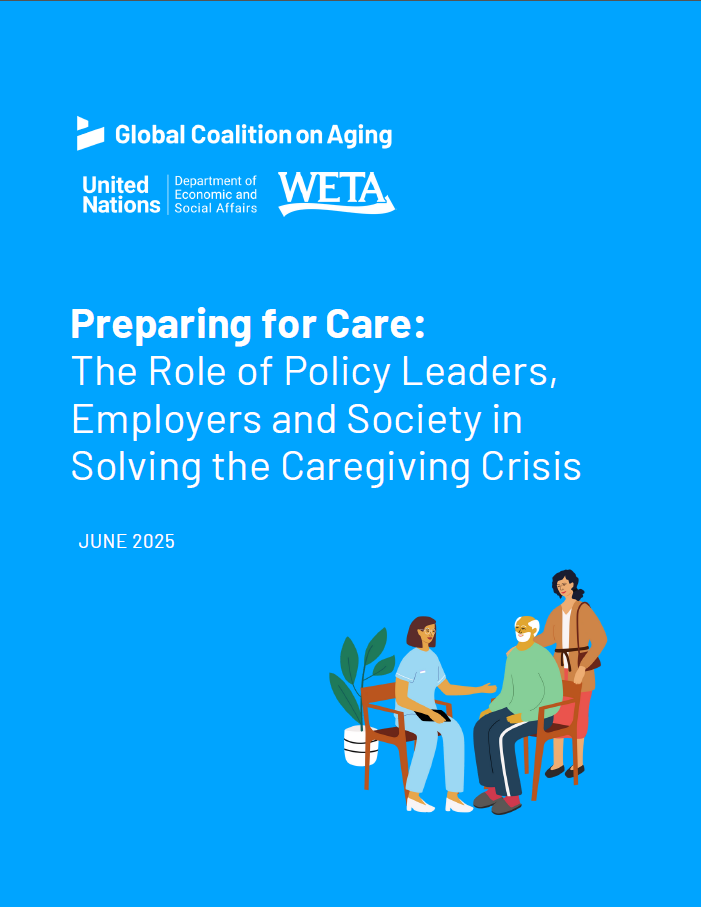 On June 13th, following the premiere of the PBS documentary Caregiving at the United Nations in New York, the Global Coalition on Aging, the United Nations Department of Economic and Social Affairs, and WETA hosted a roundtable to advance action on caregiving. This cross-sectoral roundtable built on the stories shared by caregivers in the documentary to encourage meaningful and collaborative action to address the caregiving crisis on a global scale. Participants discussed critical next steps following the awareness-raising documentary, resulting in a blueprint for action on caregiving.
On June 13th, following the premiere of the PBS documentary Caregiving at the United Nations in New York, the Global Coalition on Aging, the United Nations Department of Economic and Social Affairs, and WETA hosted a roundtable to advance action on caregiving. This cross-sectoral roundtable built on the stories shared by caregivers in the documentary to encourage meaningful and collaborative action to address the caregiving crisis on a global scale. Participants discussed critical next steps following the awareness-raising documentary, resulting in a blueprint for action on caregiving.
2025
→
The Inflation Reduction Act (IRA) introduced a critical distinction between small and large molecule drugs that threatens innovation and access to life-saving treatments, especially for older adults, cancer patients, rural communities, and those with chronic or rare diseases. This GCOA policy brief explores how the IRA’s “pill penalty” disincentivizes the development of small molecule therapies, which are often more affordable, accessible, and are essential to healthy aging. Further, the report outlines the IRA’s disproportionate impact on these vulnerable populations and the broader implications for U.S. innovation, and how congressional action through the EPIC Act may help to correct this policy imbalance.
2025
→
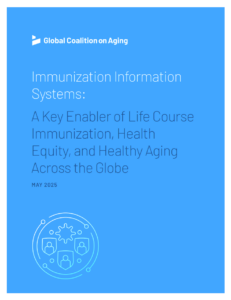 On October 14, 2024, alongside the World Health Summit in Berlin, Germany and Silver Economy Forum 2024, the Global Coalition on Aging (GCOA) convened a cross-disciplinary group of experts and leaders in Immunization Information Systems (IIS) across development, implementation, and advocacy from a diverse geographical scope, together with experts in healthy aging and policy. Experts discussed the best practices and successful IIS, challenges, and barriers, as well as the advocacy needs for IIS as a critical public health tool to advance life course immunization, health equity, and more resilient health systems in the face of global demographic change.
On October 14, 2024, alongside the World Health Summit in Berlin, Germany and Silver Economy Forum 2024, the Global Coalition on Aging (GCOA) convened a cross-disciplinary group of experts and leaders in Immunization Information Systems (IIS) across development, implementation, and advocacy from a diverse geographical scope, together with experts in healthy aging and policy. Experts discussed the best practices and successful IIS, challenges, and barriers, as well as the advocacy needs for IIS as a critical public health tool to advance life course immunization, health equity, and more resilient health systems in the face of global demographic change.
This new GCOA report distills four key takeaways and four calls to action from the roundtable discussion:
The report highlights persistent data gaps, especially in adult immunization, and the need for countries to strengthen, expand, and connect their IIS to support healthy aging and resilient health systems. It calls for bold, coordinated action to prioritize IIS development, communicate IIS value, and ensure that no one is left behind in the global effort to prevent disease and promote healthy longevity.
2025
→
This Call to Action from GCOA’s Aging with Heart Alliance urges UN Member States to address the global impact of cardiovascular disease (CVD)–the leading cause of death worldwide—within the context of rapid population aging. With CVD prevalence and associated costs rising sharply with age, the document outlines a four-part agenda: expand prevention across the full continuum of care; strengthen access to early detection and community-based treatment; invest in innovation and health system transformation; and empower patients through integrated care models. Released ahead of the 2025 UN High-Level Meeting on NCDs and Mental Health, the report emphasizes that prioritizing CVD is essential to achieving healthy aging, health equity, and long-term global health and economic resilience.
2025
→
In preparation for the 2025 UN High-level Meeting on NCDs and Mental Health (HLM4), the Global Coalition on Aging calls for a bold shift: global health priorities must include older adults, who bear a growing burden of noncommunicable diseases (NCDs) yet are often overlooked. GCOA’s Call to Action outlines critical strategies across prevention, innovation, and care systems to ensure healthy aging is central to the fight against NCDs, while also tackling ageism and structural gaps in healthcare. The Call to Action makes the case that achieving health and well-being for all—as promised in the Sustainable Development Goals—depends on recognizing and investing in older populations.
2025
→
The Global Coalition on Aging developed a comprehensive central narrative and set of talking points, Adult Immunization and the Pillars of Prevention: Reimagining Public Policy for Healthy Aging and Sustainable Economic Growth in an Aging World. The narrative and talking points are intended as a resource to empower anyone working to ensure global aging is a path for healthy longevity, fiscally sustainable economic growth, and social value creation to communicate effectively and persuasively about the importance of adult immunization for 21st century aging of societies.
The central narrative lays out three pillars that are essential to the new prevention paradigm for the 21st century, centered around adult immunization:
2025
→
On December 10, 2024, the Global Coalition on Aging brought together global experts across noncommunicable diseases (NCDs), life course immunization, healthy aging policy, economic and fiscal policy, and patient advocacy for a private roundtable. The discussion examined the growing evidence linking NCDs and vaccine-preventable respiratory diseases (VPRDs), like influenza, RSV, Covid, and pneumonia.
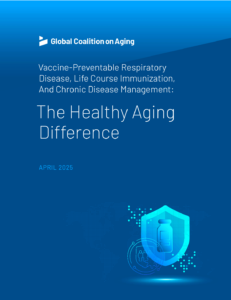
Experts at the roundtable discussed the urgent need for health systems and governments to utilize routine immunization to improve NCD prevention and management, as their prevalence rises amid the aging of society.
This April 2025 report, Vaccine-Preventable Respiratory Disease, Life Course Immunization, And Chronic Disease Management: The Healthy Aging Difference, summarizes key themes and actionable recommendations from the discussion, including the need to expand our understanding of what immunization is for.
Insights from the roundtable have also been integrated into GCOA’s Consensus Statement on Vaccine-Preventable Disease, Life Course Immunization, and Chronic Disease Management, calling for bold action from governments and cross-sectoral leaders to integrate life-course immunization into the management and prevention of NCDs. The consensus statement identifies concrete steps for individuals, healthcare systems, and governments to reduce the burden, impact, and economic costs of NCDs through life course immunization.
2025
→
This GCOA report, developed in partnership with Transamerica Institute, explores how travel serves as a catalyst for healthy longevity, enhancing physical health, cognitive resilience, and social connection. With insights from an expert roundtable, the report highlights the overlooked role of travel in public health and economic strategies.
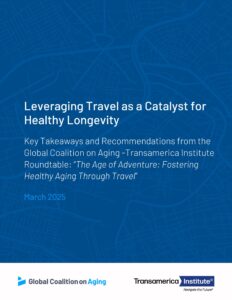 The report outlines key recommendations to maximize travel’s benefits for aging societies, including raising awareness through research, engaging policymakers, and fostering public-private collaboration. By repositioning travel as more than recreation, stakeholders can unlock its full potential for healthy aging and economic growth.
The report outlines key recommendations to maximize travel’s benefits for aging societies, including raising awareness through research, engaging policymakers, and fostering public-private collaboration. By repositioning travel as more than recreation, stakeholders can unlock its full potential for healthy aging and economic growth.2025
→
The Aging with Heart Alliance, launched by GCOA, is a global initiative dedicated to elevating cardiovascular disease (CVD) as a critical public health priority, particularly in the context of population aging. By bringing together leading experts across cardiovascular health, aging, healthcare, and advocacy, the Alliance aims to drive systemic changes in prevention, diagnosis, treatment, and care to combat the rising burden of CVD.
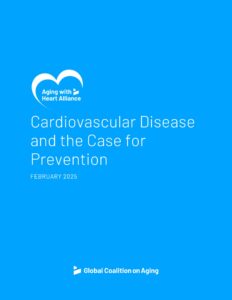 This new GCOA paper, published alongside the launch of the Aging with Heart Alliance, provides an analysis of cardiovascular disease (CVD) as the leading global cause of death and underscores the urgent need for a prevention-based approach. With the world undergoing an unprecedented aging megatrend, CVD prevention is more critical than ever, as aging populations face higher risks of multimorbidity, chronic disease, and healthcare strain. The paper advocates for a continuum-based prevention strategy—spanning primordial, primary, secondary, and tertiary prevention—to mitigate CVD’s growing burden on individuals, healthcare systems, and economies. By emphasizing innovation, policy-driven solutions, and the integration of community-based care, the paper calls for a global commitment to prioritizing prevention as a sustainable and cost-effective solution to combat CVD and promote healthier aging.
This new GCOA paper, published alongside the launch of the Aging with Heart Alliance, provides an analysis of cardiovascular disease (CVD) as the leading global cause of death and underscores the urgent need for a prevention-based approach. With the world undergoing an unprecedented aging megatrend, CVD prevention is more critical than ever, as aging populations face higher risks of multimorbidity, chronic disease, and healthcare strain. The paper advocates for a continuum-based prevention strategy—spanning primordial, primary, secondary, and tertiary prevention—to mitigate CVD’s growing burden on individuals, healthcare systems, and economies. By emphasizing innovation, policy-driven solutions, and the integration of community-based care, the paper calls for a global commitment to prioritizing prevention as a sustainable and cost-effective solution to combat CVD and promote healthier aging.
2025
→
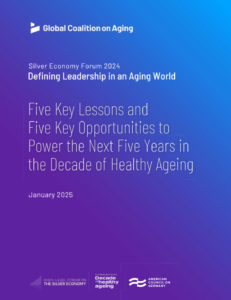 Held in Berlin, Germany, on October 15th and 16th, and the United Nations Headquarters in New York City on December 3rd, 2024, Silver Economy Forum 2024: Leadership in an Aging World explored the opportunities associated with the growing global Silver Economy in a world of changing leadership and discussed what’s needed for successful leadership across issues and generations.
Held in Berlin, Germany, on October 15th and 16th, and the United Nations Headquarters in New York City on December 3rd, 2024, Silver Economy Forum 2024: Leadership in an Aging World explored the opportunities associated with the growing global Silver Economy in a world of changing leadership and discussed what’s needed for successful leadership across issues and generations.
Now in its fifth year, the Silver Economy Forum 2024 highlighted key themes at the intersection of leadership, successful aging, and the Silver Economy, including healthcare and finance challenges, technology’s impact on aging, the core elements in an age-friendly environment, and the future of traditional consumer businesses.
Linking to the goals and aspirations of the UN Sustainable Development Goals and the Decade of Healthy Ageing, speakers at the Forum included representatives from international organizations, leaders in business and government, scientists and academicians as well as civil servants that are leading developments at a grass-roots level.
The Global Coalition on Aging is pleased to have partnered with the American Council on Germany, the Permanent Mission of Germany to the United Nations, and the United Nations Department of Economic and Social Affairs for this year’s Forum.
For more information and to see video from the sessions, please visit the Silver Economy Forum website.
2025
→
On November 12, 2024, the Global Coalition on Aging and the Acton Institute brought together a diverse group of thought leaders—including senior clergy, scientists, G7 leaders, patient advocates, and private sector innovators—at the Pontifical Academy of Sciences in Vatican City for a critical discussion on antimicrobial resistance (AMR). The event, entitled Solving for Antimicrobial Resistance: A Rising Global Health and Humanitarian Crisis, underscored the urgent need for innovation in the fight against drug-resistant diseases, and highlighted the profound humanitarian, ethical, and economic implications of AMR.
The gathering produced a powerful statement calling for urgent global action on AMR, emphasizing the humanitarian, ethical, and economic implications of this growing crisis with the five following key points:
“Antimicrobial resistance is not a distant threat—it is already undermining the health and longevity of millions, especially older adults and vulnerable populations, as was recently noted in The Lancet.1 We have the knowledge and tools to address this crisis, but it will require urgent action from governments, the private sector, and global organizations. The time to act is now, and we must do so with a commitment to equity and global solidarity. Our collective response will determine whether we safeguard the medical advancements of the last century or risk losing them entirely and lurch into a world without antibiotics “
— Mike Hodin, CEO, Global Coalition on Aging
A Growing Global Crisis
Antimicrobial resistance (AMR) threatens to undo decades of medical progress. Currently, AMR is associated with approximately 5 million deaths annually and is projected to cause 39 million deaths over the next 25 years if left unchecked.1 The most vulnerable populations, particularly older adults and the marginalized, face a disproportionate burden from AMR. For these individuals, routine treatments are becoming increasingly unsafe, and the risk of fatal infections is rising. Without urgent action, the world is on the brink of returning to an era where common infections are again life-threatening.
The meeting also underscored the need for global collaboration. Governments, the private sector, and international organizations must work together to create a sustainable pipeline for new antimicrobial innovations. The G7 and EU are encouraged to prioritize regulatory reforms and financial incentives to accelerate research and ensure equitable access to life-saving medicines.
A Call for Justice and Equity in Healthcare
As the Holy See emphasized at the 2024 United Nations High-Level Meeting on AMR, overcoming health inequities is central to addressing the AMR crisis. Pope Francis has often called for action on social justice, and the fight against AMR is a critical issue of fairness and equity. By strengthening market conditions for the development of antimicrobials, society can ensure that all people, regardless of their socio-economic status, have access to the treatments they need.
Hope for the Future
Despite the challenges, there is hope. Countries such as the UK, Japan, Italy, and Canada have taken steps to implement “push” and “pull” incentives, and the U.S. is considering the PASTEUR Act to address the crisis. But more must be done, and it must be done quickly – urgent and coordinated action is needed worldwide to address the pressing issue of AMR.
2024
→
2024
→
 In December 2024, IQVIA released a new white paper, developed in collaboration with GSK and GCOA, examining the significant economic and clinical burden of Respiratory Syncytial Virus (RSV) in older adults (age ≥60 years) across select high-income APEC countries, including China, Japan, South Korea, Canada, Singapore, New Zealand, Australia, Hong Kong, and Taiwan.
In December 2024, IQVIA released a new white paper, developed in collaboration with GSK and GCOA, examining the significant economic and clinical burden of Respiratory Syncytial Virus (RSV) in older adults (age ≥60 years) across select high-income APEC countries, including China, Japan, South Korea, Canada, Singapore, New Zealand, Australia, Hong Kong, and Taiwan.
The study estimated that in 2023, RSV caused around 778,000 hospitalizations and USD 2.8 billion in costs, with the highest burden observed in China, followed by Japan and Canada. On average, 1 in 500 older adults were hospitalized annually, with costs ranging from USD 2,735 in New Zealand to USD 12,826 in Canada. The true burden of RSV is likely under-reported due to non-specific symptoms, suboptimal diagnostics, and inconsistent testing. The paper and its findings highlight the critical need for dedicated surveillance systems and standardized diagnostic practices for RSV in Asia-Pacific countries.
2024
→
Following the passage of the Inflation Reduction Act in 2022, healthcare systems in the United States are facing many changes in the name of saving costs and creating efficiencies. But do the benefits actually outweigh the costs?
GCOA’s issue brief, “Utilization Management Post-Inflation Reduction Act and the Threat to Healthy Aging,” addresses the unintended negative consequences of utilization management (UM) on older, minority and other underserved populations. As the population aged 65 and older grows rapidly, projected Medicare costs are soaring, prompting insurers to adopt UM strategies to control expenses. These methods—such as step therapy, prior authorization, and quantity limits—aim to assess the necessity of medications but often restrict patient access and delay essential treatments.
UM disproportionately affects older Americans, many of whom manage multiple chronic conditions and rely on numerous medications. Additionally, underserved populations face higher claim rejections, exacerbating existing health disparities. Delays in accessing critical treatments can lead to severe health consequences, particularly for those who rely on uninterrupted access to the best medications for their treatment plan.
Administrative burdens imposed by UM further complicate care, increasing stress for patients, caregivers, and healthcare providers – all begging the question whether UM strategies truly result in any net savings. The brief calls for a reevaluation of UM as a cost-saving method, advocating for alternative solutions that prioritize patient health and equitable access to medications, particularly as our aging population continues to grow.
This issue brief was made possible by support from Bristol Myers Squibb.
2024
→
Growing evidence suggests that employers across size, sector, and industry types are now recognizing support for their employees’ health as a “must have,” or, to be more precise, “a must offer.” In these calculations, preventive care has become a key priority for the workforce, not least because of the parallel benefits to the employer.
 This new GCOA paper, launched ahead of Silver Economy Forum 2024, examines how industry leaders are creating business value, engaging their workforce, improving productivity and economic value, and advancing top private-sector priorities by taking action on preventive health for their employees through employee benefits and policies, such as supporting access to adult immunization, mental health supports, and health screenings. The paper outlines how companies like Amazon, Amgen, Bank of America, Biogen, British Airways, Citibank, Dell, Edwards, Google, IBM, and Microsoft have made robust efforts to embrace employee health and well-being.
This new GCOA paper, launched ahead of Silver Economy Forum 2024, examines how industry leaders are creating business value, engaging their workforce, improving productivity and economic value, and advancing top private-sector priorities by taking action on preventive health for their employees through employee benefits and policies, such as supporting access to adult immunization, mental health supports, and health screenings. The paper outlines how companies like Amazon, Amgen, Bank of America, Biogen, British Airways, Citibank, Dell, Edwards, Google, IBM, and Microsoft have made robust efforts to embrace employee health and well-being.
2024
→
 As global populations age, the need for businesses to recruit and retain older workers becomes increasingly vital. This new report, together with GCOA member Bank of America, explores the importance of embracing this demographic shift, not only to combat ageism but also to enhance organizational success and foster healthier communities.
As global populations age, the need for businesses to recruit and retain older workers becomes increasingly vital. This new report, together with GCOA member Bank of America, explores the importance of embracing this demographic shift, not only to combat ageism but also to enhance organizational success and foster healthier communities.
Employee benefits packages, including health insurance, retirement plans, and flexible work arrangements, are crucial tools for attracting and retaining older talent. By offering tailored benefits—such as caregiving leave, phased retirement, and financial planning support—employers can extend careers, leverage the unique expertise of older workers, and ensure sustained productivity.
This report highlights best practices for creating an age-inclusive environment, demonstrating how businesses can build comprehensive benefits that support both personal and professional well-being, resulting in a healthier, more engaged workforce.
2024
→
On Ageism Awareness Day 2024, GCOA launched a new report highlighting the role of ageism as a social determinant of health, illustrated through the example of heart valve disease. As outlined in the paper, The Health and Economic Costs of Ageism as a Social Determinant of Health: The Case of Heart Valve Disease, ageism results in underdiagnosis and undertreatment of conditions like heart valve disease, where timely intervention can dramatically improve outcomes and lead to significant cost savings for health systems and society.
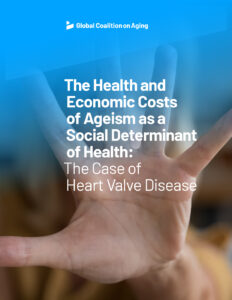 Despite tremendous scientific innovation and the availability of advanced treatments, ageist systems, attitudes, and beliefs continue to place countless lives at unnecessary risk by preventing timely access to care and treatment. The paper shares evidence of ageism’s impact on health outcomes and system costs and outlines concrete steps for stakeholders to take in the fight against ageism, unlocking the full benefit of innovation for individuals and their families, healthcare systems, and society at large.
Despite tremendous scientific innovation and the availability of advanced treatments, ageist systems, attitudes, and beliefs continue to place countless lives at unnecessary risk by preventing timely access to care and treatment. The paper shares evidence of ageism’s impact on health outcomes and system costs and outlines concrete steps for stakeholders to take in the fight against ageism, unlocking the full benefit of innovation for individuals and their families, healthcare systems, and society at large.
